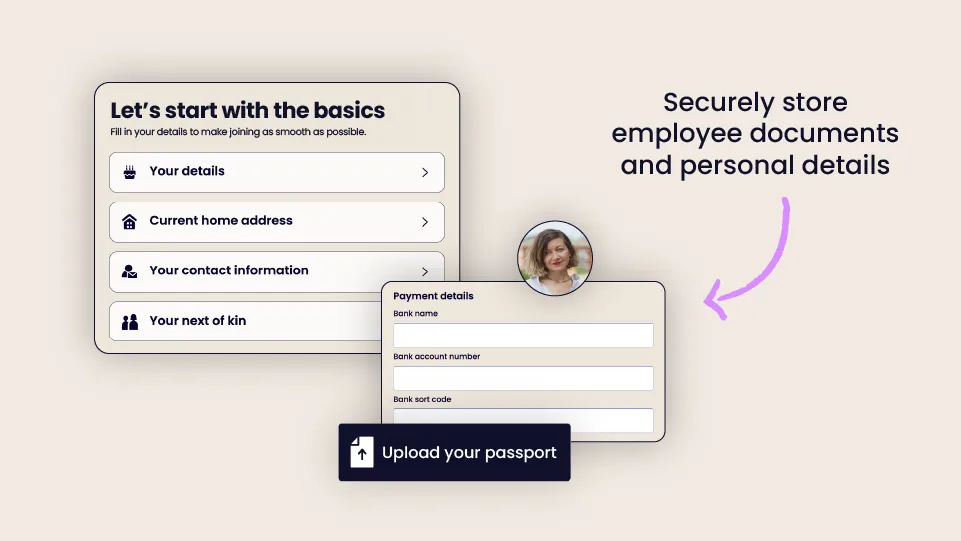HR compliance: all you need to know for 2024

Having worked for a small business such as CharlieHR, I've done my fair share of checking and double-checking what HR compliance means for small businesses.
My role at Charlie is not exactly the typical HR person – I advise our customers on the best course of action to take when it comes to their business. I also draw employment contracts, build HR policies, run health & safety training sessions and much more.
This role has given me tons of experience in many various situations, and back when Charlie didn't have a dedicated HR person, I was also the go-to person when it came to HR compliance.
Our leaders were often worried about "doing the right thing", and since I had all the knowledge in hand, I was more than happy to help. That's why today, I would also like to share it with you.
In this blog post, I'll give you a tour of what HR compliance means based on almost 10 years of experience in the small business space.
What is HR Compliance?
HR compliance is the way a company defines its policies and procedures to make sure they’re staying on the right side of the law and carrying out fair practices.
It encompasses a lot of aspects from HR policies, grievance procedures, DE&I strategies or redundancies. This is just to name a few, but there are many more areas you can focus on depending on the type of business you're running.
3 reasons why you should care about HR compliance
If you think the word “compliance” comes with a wodge of red tape wrapped around it, you’re not alone.
It’s easy to dismiss something we don’t understand, but this is something you should 100% get right to avoid problems down the line, and make sure you protect your business as well as your team.
Here are 3 reasons why you should absolutely care about HR compliance:
- Avoiding any legal fees or employment courts by ensuring you always comply with the law and stay on top of it – employment laws are regularly updated, so it's important you don't lose sight of it and make the changes in due time
- Running your business smoothly and focusing on what matters – once you know you've done everything by to the book, you've got more headspace to focus on growth and avoid unnecessary stress
- Retaining your team in the long run and building a good employer brand by showing how committed you are to running a business that will protect them – this means they will trust you and your ability to run the business, and are more likely to stay rather than look for somewhere else to work
The ultimate goal is to find the “HR compliance sweet spot” where you meet all legal requirements while still making sure you hit your HR objectives.
10 Key Areas for HR Compliance
Human Resources compliance covers a lot of aspects. That's why I just thought it'd be easier to give each of these aspects a section of its own so you can have a look at what are the most important ones you should focus on.
1.Start with the basic legal requirements: HR policies and employer's liability insurance
The first step to HR compliance is to cover your assets and your company as well as your employees.
So focus on creating the 3 HR mandatory HR policies your business needs to get u[ and running. I often hear small businesses trying to get away without having those, but it just won't make the cut.
Here are the three ones you should have:
- Health and safety policy
- Disciplinary or dismissal policy
- Grievance policy
Once that's done and they've been written by an HR professional like myself to avoid any issues, you should think about getting an employer's liability insurance.
Why, will you ask? A few reasons, but the main ones are that it's a legal requirement in the UK and that it will protect yourself and your employees – if you don't, you're exposing yourself to a potential fine of £2,500 per day which could result in serious consequences for your business.
2.Draw legal employment contracts and set the right employment statuses
First things first before hiring someone in your team: have legally compliant employment contracts.
And I don't mean employment contract templates you just got from an unreliable source on the internet. If you do go down this route, have a look at whether an HR expert has cast their eyes over these (like the ones we offer in the blog post I just linked to).
Employment contracts should be your priority before even thinking of your hiring process because they give you legal cover – and that's also another reason for setting the right types of employment status for your employees.
So don't be in a hurry and ensure this is done first.
3. Create an Employee Handbook
Your employee handbook is the Holy Grail of your company’s policies, even the ones that aren’t required by law.
It’s the place where all your policies and procedures are laid out for team members to access any time they want, and it needs to be regularly updated to ensure you stay compliant in the long term.
As well as writing out everything so that your employees are in the loop, it helps to make your handbook accessible to everyone who needs it - whether that’s through your company portal or whether you send it via email to every new hire.
Having a company handbook isn’t a legal requirement as such, but it’s good practice to ensure transparency in your business, so maybe think about it before it becomes a problem.
4. Draw the right documents and procedures for your business
Although we've already established that a grievance or disciplinary policy is essential, it also comes with lots of documents and procedures that you should build.
Without a proper procedure in place, it's unlikely you'll be able to react promptly when an issue arises – forgetting steps of the legal process such as issuing a written warning template or drawing a training agreement template could really impact your business, legally and financially.
In situations such as gross misconduct or termination of employment, you don't want to drop the ball, and you want to have a clear procedure to deal with the matter – so perhaps think about having a bank where you keep all your templates and a step-by-step process outlined for every manager and person responsible for HR at your business.
These situations can be really disconcerting, but they can be skillfully handled as long as you're prepared for them.
5.Make your hiring process bullet-proof
Same as with everything else, having no process or policies in place paves the way for legal issues that can happen before, during, and after you’ve made a new hire. This is why it’s critical to make sure your business is compliant throughout every step of the hiring process.
There are multiple steps in the hiring process (not to mention the ongoing care that employees need to make sure they’re happy and healthy members of your team).
Each step requires a certain level of compliance, and going through each step in a checklist-style way can help you stay legal.
- The interview stage - consolidate your interview procedures and questions, and determine how you’ll check references.
- The hiring stage – firm up your offer letters, fill in new hire paperwork, and write legal contracts.
6.Think about wages and salaries
Legally, there are two aspects you should worry about when it comes to wages and salaries:
- Ensure you pay, at least, the UK minimum wage to your team members
- Get them on the correct UK tax code when they get onto the payroll
These are, of course, very basic requirements – another aspect you should think about (that's not a legal requirement) is to ensure you pay your team members fairly.
That goes without saying that it will give you a competitive advantage in the job market, so do some research and perhaps hire someone externally to have a benchmarking process.
As for legal requirements here, remember that as soon as you have more than 250 employees, you must publish a gender pay gap report.
7. Be knowledgeable about potential redundancy processes
Redundancies are not an event any business owner wants to go through, but unfortunately, they sometimes have to become a reality.
Instead of burying your head in the sand, you should make sure you understand what redundancies are – the more you know about what needs to happen and what you need to do, the less scary they'll become.
Making someone redundant is an incredibly difficult experience for the employee, so you should handle it as smoothly as possible without any other hurdles. It's your responsibility as an employer.
There are also a lot of legal requirements you need to take into account when someone's job is no longer needed, and that's where understanding what redundancy selection criteria will be crucial to avoid any legal issues.
8.Set the right probation and notice periods
To smoothly handle your hiring process, you should also think about two elements of it: probation and notice periods.
A probation period is the amount of time your team members will be on probation before they are officially hired – they'll get the same rights in terms of pay and holidays, however, if they don't make the cut, it's easier to let them go.
Notice periods are set in the employee's contract and define how much notice they need to give before handing their notice and can vary depending on the role – if you have important stakeholders in your company, you may want to add a longer notice period for example.
There are lots of technicalities involved and different situations, so get it right and don't forget any aspect of it.
9.Spot and handle discrimination in the workplace
Remember that the are also laws protecting your employees against discrimination. Whether it's about disability, age, race or gender, you should have procedures in place to spot and handle any issues in your workplace.
10.Invest in your day-to-day HR compliance now
There are also a few actions you should take when it comes to your day-to-day work that I have not included in the above, but that should also become part of another checklist for you:
- Ongoing tasks include checking and storing employees’ Right to Work information (which you can safely store in CharlieHR’s software) and getting Employers’ Liability Insurance.

- Recording your team member's time off to get accurate records and understand where and why an employee has been absent
If you’re feeling overwhelmed and bogged down with the little, repetitive tasks that come with running a small business, an HR compliance checklist can also help. Find out more in our blog post and download a free template.
Taking HR compliance one step further
HR compliance surely is about keeping your HR in line with law requirements, however, it's not the only aspect you should focus on.
Successful companies don’t stop at what is required by the law. You can use that as a springboard to outline and create policies that will retain your team members for the long run, along with staying compliant with the law.
So perhaps think about putting together an employee handbook that has a forward-thinking parental policy or even a menopause policy.
There are many options to choose from, and if you're looking for advice for HR compliance in general and to build your own policies, me and my teammates can help – with over 20 years of expertise in the HR field, we can give you the answers and support you need. Book a call with one of us today to find out more.


